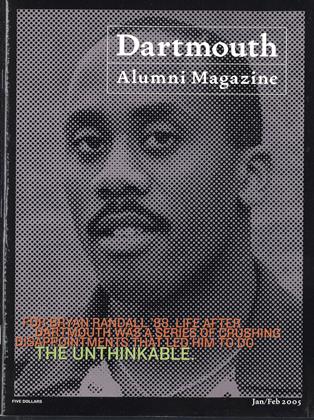With $457.5 million of its $1.3 billion goal already in the bank, the College kicked off its Campaign for the Dartmouth Experience in November. It is Dartmouth's first major fundraising initiative since 1996, when $568 million was raised.
Co-chairs of the campaign are R. Bradford Evans '64 and and Peter Fahey '68, Th'69, both of New York.
The campaign has four specific funding objectives—$736 million for academics, faculty, facilities, equipment and programs, $187 million for residential and extracurricular facilities and programs, $146 million for financial aid, and the generation of $244 million in annual giving as well as numerous naming opportunities.
Dollar goals were arrived at based on the strategic plan presented by President James Wright in 2002 that emphasized the marriage of teaching and scholarship as well as the quality of student life and learning.
Monies raised toward the faculty goal will be used to recruit and retain professors, enable them to become involved in emerging fields, and to increase their numbers in order to keep class sizes small. Facilities from classrooms to laboratories will be improved and expanded, including space for the mathematics department, the Dickey Center, the Ethics Institute, the Leslie Center for Humanities, life sciences, engineering and the arts.
The amount earmarked for residential life will pay for new dormitories, a dining commons, athletic facilities and student activities.
The financial aid target includes both $130 million for the endowment to assure the continuation of need-blind admissions and adequate support for needy students, as well as $16 million for graduate student fellowships. The goal reflects the Colleges strategy to draw less financial aid from annual operating budgets and more from long-term investments.
Campaign materials make the case for the $244 million in annual giving to bring Dartmouth's endowment in line with those of other leading institutions. Despite its threefold growth over the last decade, Dartmouth's endowment is roughly 30 percent of Princeton's and less than 40 percent of Harvard's when computed on a per-student basis.
To achieve its goal, the campaign hopes to attract at least one gift of $100 million, 50 of $2.5 million and 1,000 of $50,000.
For more information about the campaign, visit www.dartmouthexperience.org
 View Full Issue
View Full Issue
More From This Issue
-
 Cover Story
Cover StoryComing Undone
January | February 2005 By Matthew Mosk ’92 -
 Feature
FeatureCritical Faculties
January | February 2005 By BONNIE BARBER -
 Feature
FeatureFree Bird
January | February 2005 By BRYANT URSTADT ’91 -
 Feature
FeatureNotebook
January | February 2005 By THOMAS AMES JR. '74 -
 Feature
FeatureAlumni News
January | February 2005 By Steven Gordon '79 -
 INTERVIEW
INTERVIEWPresidential Range
January | February 2005 By William Jaspersohn ’69







